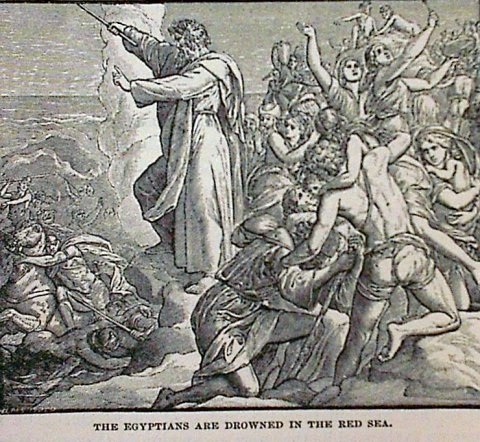There is a charming classical midrash that says, "Arranging marriages is as difficult for the Holy Blessed One as was the parting of the Red Sea" (Leviticus Rabbah 8). Bringing you together with your soulmate is a divine miracle on par with the parting of the Red Sea. Doesn't that sound nice? Well, the Zohar is not buying it—not on the surface level, anyway. The Zohar blows up this midrash and puts it back together again in a way that could break your heart. |
"Was parting the Red Sea so difficult for God?" asks the Zohar. "Is it not true that as soon as God is resolved to do something all obstacles are as nothing? How was it that the dividing of the Red Sea was difficult for God?" (Zohar II 170a). Good question.
The Zohar's answer is that it was not the physical challenge of parting the sea that was difficult. The difficulty was in choosing the lives of the Israelites over the lives of the Egyptians. The Zohar says that the angel of the Egyptians spoke to God about this before Pharaoh's army plunged into the sea.
The angel asked God, "Master of the universe, why would you want to punish Egypt and divide the Red Sea for Israel? Have they not all sinned against You? Don't You rule with justice and truth? Yes, the Egyptians are idolaters, but so are the Israelites. Yes, the Egyptians are murderers, but so are the Israelites. How can you choose between them?"
What could God say?
That was the moment, says the Zohar, that God faced the most difficult choice possible. How could the God of justice brush aside justice to save one people at the expense of another? That is the difficulty of the parting of the Red Sea.
The Zohar finds a message about God's agonizing choice hidden in a strange silence in the story. In this week's Torah portion (Beshalach), Moses exhorts the Israelites not to fear the advancing Egyptians. He says, "Adonai will battle for you. Hold your peace!" (Exodus 14:14). And then, in the very next verse, God says to Moses, “Why do you cry out to Me? Tell the Israelites to go forward!" (Exodus 14:15). What happened between those two verses? When did Moses cry out to God? How are the Israelites to "go forward" before the waters have been parted? What's missing from the story?
The Zohar says that the missing moment is the moment of God pondering the horrible dilemma. When God asked Moses the question, "Why do you cry out to Me?" the Zohar reads it as a moral challenge. It is as if God asked Moses, "Did you really think that I would save you at the expense of the Egyptians because of your pleas? Don’t cry to Me. Rather, cry out to the Israelites and beg them to behave in a manner that will make them worthy of being saved! Tell them to ‘go advance’ … in their behavior!”
That is what is missing from the story—the way that God struggles over the fate of one imperfect people over another. None is without faults, yet some must flourish while others perish. God makes choices where there are no good choices, and God agonizes over it. Who will live and who will die? How can God make choices if human beings will not "go advance" in their choices?
And what does this have to do with arranging marriages? The Zohar wants to tell us that these tough choices are not just about nations and the broad scope of human history. They happen every day on a personal scale. Every wedding sets into motion events that will lead to "weeping for some and singing for others," says the Zohar. It is hard, even for God, to discern how to allocate good and bad fortune in a world so clouded by uncertainty, human frailty and moral shades of gray.
Your marriage and all of your sacred relationships are miracles as wondrous as the parting of the Red Sea. It is up to you to recognize this and to make yourself worthy of the miracle. If your relationships bring you suffering, recognize that God also suffers agony over it. If your relationship bring you joy, may that joy be something that you earn through your behavior every day.
Go advance.
Other Posts on This Topic:
God of the Natural or the Supernatural?
"Not One of Them Was Left"


 RSS Feed
RSS Feed
